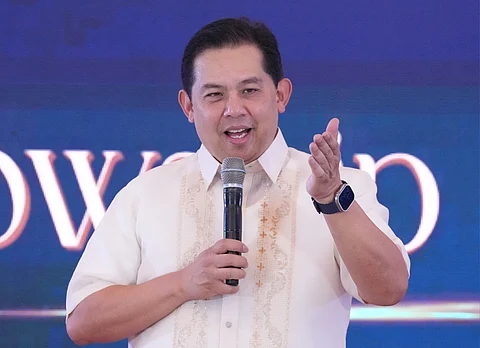
- NEWS
- the EDIT
- COMMENTARY
- BUSINESS
- LIFE
- SHOW
- ACTION
- GLOBAL GOALS
- SNAPS
- DYARYO TIRADA
- MORE

Keeping its promise to promote transparency, the House of Representatives on Tuesday adopted a resolution opening the bicameral conference committee meetings to civil society organizations, particularly the closing phase of the controversial budget-making process.
The adoption of House Resolution 94 came two weeks ahead of the deliberations for the P6.73 billion national budget for 2026. The proponents are Speaker Martin Romualdez and Tingog Reps. Yedda Romualdez, Julian Romualdez, and Jude Acidre.
"The voice of the people is certainly stronger in the deliberation of the 2026 national budget for a more transparent process," the Speaker said.
The resolution aims to allow the participation of bona fide civil organizations as third-party observers during the deliberations of the powerful committee on appropriations, tasked with overseeing the annual national budget.
Accreditation, however, is required to enable the organization to physically attend all public hearings conducted by the panel, including its sub-committees, during the crafting of the national budget.
The appropriations panel will coordinate with the committee on people’s participation to determine the eligibility, accreditation process, and scope of civil society groups' participation in accordance with House rules.
Workers in the vital sectors, such as education, public health, social welfare, environment, agriculture, and local governance, will be given priority as proponents believe that their on-the-ground expertise can help shape a more responsive and equitable budgeting process.
The adoption of the resolution was part of the House leadership’s efforts for greater transparency in the budget process in light of the allegations of illegal insertions of billions of pesos in this year’s budget. The “budget insertions” were heavily blamed on the bicam, composed of selected members of the House and the Senate, and whose meetings are traditionally held closed-door.
President Marcos Jr. had already issued a stern warning to members of Congress that he would return the 2026 General Appropriations Bill (GAB) should it contain line items that are not fully aligned with the administration’s proposed budget, regardless of whether it results in a reenacted budget.
A reenacted budget would mean that the previous year's GAA would remain in effect until both houses of Congress pass the current GAB. This could result in an economic slowdown and may hamper the delivery of government services as new programs and projects will be unfunded.
Marcos’ warning was triggered by the recent widespread severe flooding in Metro Manila and nearby provinces brought about by three consecutive typhoons and southwest monsoons, despite him boasting during last year’s SONA that 5,500 flood control projects had been completed and there are more under construction.
The 2025 GAA, originally set at P6.352 trillion, was trimmed down to P6.326 trillion after Marcos vetoed P194 billion worth of line items deemed inconsistent with his administration's priority programs, P16.7 billion of which was for the flood control projects.
This year’s budget was also widely criticized for allegedly featuring padded unprogrammed and discretionary funds while subsidies for key sectors like education and healthcare suffered deep cuts.
Watchdogs, anti-corruption advocates, and even business groups have long petitioned Congress to make the bicam accessible to the public, arguing that the lack of transparency in the pivotal proceedings opens the floodgates for manipulation and illegal insertions.
Earlier this week, appropriations panel chair Mikaela Suansing announced plans to implement reforms in the crafting of the budget, including the abolition of the so-called “small committee” tasked with finalizing institutional amendments after the second reading approval of the GAB.
The establishment of the “small committee” triggered concerns among watchdogs, including Navotas Rep. Toby Tiangco—appropriations panel vice chair during the previous Congress—which deemed it as a secretive enclave for last-minute insertions.
